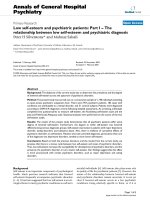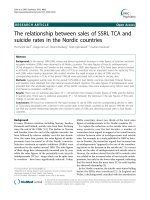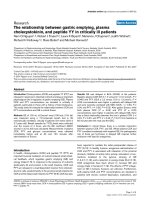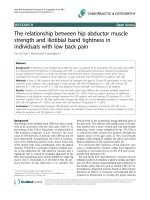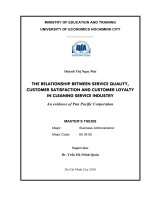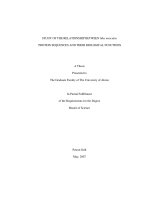The relationship between students’ self efficacy beliefs and their english language achievement
Bạn đang xem bản rút gọn của tài liệu. Xem và tải ngay bản đầy đủ của tài liệu tại đây (1.24 MB, 124 trang )
MINISTRY OF EDUCATION AND TRAINING
HO CHI MINH CITY UNIVERSITY OF TECHNOLOGY
---------------------------
NGUYEN NGOC LYNH DAN
THE RELATIONSHIP BETWEEN STUDENTS’
SELF-EFFICACY BELIEFS AND THEIR
ENGLISH LANGUAGE ACHIEVEMENT
Major: English Language
Course code: 60220201
HO CHI MINH CITY, May 2021
1
MINISTRY OF EDUCATION AND TRAINING
HO CHI MINH CITY UNIVERSITY OF TECHNOLOGY
---------------------------
THE RELATIONSHIP BETWEEN STUDENTS’
SELF-EFFICACY BELIEFS AND THEIR
ENGLISH LANGUAGE ACHIEVEMENT
Submitted to the
Faculty of English Language
in partial fulfillment of the Master’s degree in English Language
Course code: 60220201
By
NGUYEN NGOC LYNH DAN
Supervised by
TRUONG CONG BANG, PHD
HO CHI MINH CITY, May 2021
2
The thesis entitled “The relationship between student’s Self-efficacy beliefs and
their English language achievement” was successfully defended and approved on
March date 30th at Hochiminh City University of Technology (HUTECH).
Academic supervisor: Dr. Truong Cong Bang
Examination Committee
1. Dr. Nguyen Thi Kieu Thu
Chair
2. Dr. Tran Quoc Thao
Reader 1
3. Dr. Nguyen Ngoc Tran Chau
Reader 2
4. Dr. Cao Thi Phuong Dung
Member
5. Dr. Le Van Tuyen
Secretary Member
On behalf of the Examination Committee
Chair
1
CERTIFICATE OF ORIGINALITY
I certify my authorship of the thesis submitted today entitled:
THE RELATIONSHIP BETWEEN STUDENT’S SELF-EFFICACY
BELIEFS AND THIER ENGLISH LANGUAGE ACHIEVEMENT
In terms of the statement of Requirements for theses in Master’s programs
issued by the Higher Degree Committee of Faculty of English language, Ho Chi
Minh University of Technology.
Ho Chi Minh City, February 2021
Nguyễn Ngọc Lynh Đan
i
RETENTION AND USE OF THE THESIS
I hereby state that I, Nguyen Ngoc Lynh Dan, being the candidate for the
degree of Master of Art (English Language), accept the requirements of the
University relating to the retention and use of Master’s Theses deposit in the
Library.
In terms of these conditions, I agree that the original of my thesis deposited
in the Library should be accessible for the purposes of study and research, in
accordance with the normal conditions established by the Librarian for the care,
loan and reproduction for theses.
Ho Chi Minh City, February 2021
Nguyễn Ngọc Lynh Đan
ii
ACKNOWLEDGEMENT
I owe considerable thanks to many people for their support, assistance and
encouragement enabling me to complete this thesis. Particularly, I would like to
acknowledge the contribution of the teachers at Dong Nai Technology University.
In particular, I would like to thank my supervisor, Dr Truong Cong Bang,
who has provided me with intellectual guidance and support as well as his unfailing
faith in my ability to complete this challenging attempt.
I am also indebted to all the teachers at Hutech University, especially Dr.
Nguyen Thi Kieu Thu, who gave me precious advice and generously continued to
offer counsel and guidance on my research.
In addition, I would like to thank the Foreign Language Faculty – Dong Nai
Technology University for allowing me to do a survey and interview. I would like
to express my gratitude to Ms. Huynh Nhu Yen Nhi for her help and her permission
for the information to be used.
This study could not have been completed without the support of my family
and friends who provided me with the support and encouragement to keep going
with the research.
iii
ABSTRACT
This study focuses on the influences of self-efficacy beliefs in English
learning between male and female university students. There was a total sample of
128 university Non-English majors from Dong Nai Technology University in Bien
Hoa city. The quantitative component used a questionnaire asking about students’
background and their self-efficacy beliefs in learning English. Ten students were
individually interviewed to be able to clarify the reasons that affected their selfefficacy beliefs and their English performance. T-test was used to find out the
gender differences in self-efficacy’s level and English achievement’s degree. The
results showed that female students are had higher self-efficacy than male students
The result showed that there was a positive relation between self-efficacy and
learning English achievement. If the value of Achievement increases, the value of
Self-efficacy also increases, and vice versa, if the value of Self-efficacy increases,
the value of the variable Achievement also increases. There are the differences
between male and female students in their confidence levels and English learning
achievement were found. It was found that girls were more effective in learning
English. The interview was applied to make clear the reasons for the differences.
The thesis finishes with a set of recommendations for teachers to pay attention on
the importance of self-efficacy because it influences learning English achievement.
Key word: self-efficacy, learning English achievement, university students,
Vietnamese students, English as a second/foreign language
iv
TABLE OF CONTENTS
CERTIFICATE OF ORIGINALITY...................................................................... i
RETENTION AND USE OF THE THESIS .......................................................... ii
ACKNOWLEDGEMENT ...................................................................................... iii
ABSTRACT ............................................................................................................. iv
TABLE OF CONTENTS ..........................................................................................v
LIST OF TABLES ................................................................................................ viii
LIST OF FIGURES ................................................................................................ ix
LIST OF ABBREVIATIONS AND SYMBOLS ....................................................x
CHAPTER 1: INTRODUCTION ............................................................................1
1.1. Background to the study ...................................................................................1
1.2. Statement of problem .......................................................................................3
1.3. Objectives of the study .....................................................................................4
1.4. Research questions ...........................................................................................4
1.5. Scope of the study ............................................................................................4
1.6. Significance of the study ..................................................................................5
1.7. Definitions of the key terms .............................................................................5
1.8. Organization of the thesis .................................................................................6
CHAPTER 2: LITERATURE REVIEW ................................................................7
2.1. Introduction ......................................................................................................7
2.2. Self-efficacy .....................................................................................................7
2.2.1. Definitions of self-efficacy ........................................................................7
2.2.2. Self-efficacy and Social Cognitive Theory ...............................................7
2.2.3. Sources of self-efficacy .............................................................................8
2.2.4. The effect of self-efficacy ........................................................................14
2.3. Factors enhancing self-efficacy ......................................................................17
2.4. Self-efficacy and learning achievement .........................................................19
2.5. Self-efficacy and gender .................................................................................22
v
2.6. Previous studies ..............................................................................................23
2.7. Conceptual framework ...................................................................................26
2.8. Summary.........................................................................................................28
CHAPTER 3: METHODOLOGY .........................................................................29
3.1. Introduction ....................................................................................................29
3.2. Research design ..............................................................................................29
3.3. Research site / Research context ....................................................................30
3.4. Sample and sampling producedures ...............................................................30
3.5. Research instruments ......................................................................................33
3.5.1. Questionnaire ...........................................................................................33
3.5.2. Interview questions ..................................................................................35
3.5.3. End-of-semester tests and scoring. ..........................................................36
3.6. Data collection procedures .............................................................................37
3.6.1. Piloting Procedure ...................................................................................37
3.6.2. Data Collection ........................................................................................38
3.7. Data analysis procedures ................................................................................39
3.7.1. Quantitative data analysis ........................................................................39
3.7.2. Qualitative data analysis ..........................................................................40
3.8. Validity and reliability ....................................................................................41
3.8.1. Validity ....................................................................................................41
3.8.2. Reliability ................................................................................................42
3.9. Ethical issues ..................................................................................................44
3.10. Summary .......................................................................................................45
CHAPTER 4: RESULTS AND DISCUSSIONS ..................................................46
4.1. Introduction ....................................................................................................46
4.2. Results from students’ survey ........................................................................46
4.2.1. Level of self-efficacy of English language learners in DNTU ................46
4.2.2. Results from students’ scores ..................................................................52
4.2.3. The relationship between self-efficacy and learning achievement..........54
4.2.4. The relationship between genders and self- efficacy...............................55
vi
4.2.5. The relationship between gender and English achievement ....................57
4.2.6. Results from students’ interview .............................................................57
4.3. Discussions .....................................................................................................61
CHAPTER 5: CONCLUSION ...............................................................................68
5.1. Summary of the main findings of the thesis ...................................................68
5.2. Implications of the research............................................................................69
5.3. Limitation of the research ...............................................................................70
5.4. Recommendations for further research ..........................................................70
REFERENCES ........................................................................................................72
APPENDIXES .........................................................................................................88
APPENDIX A: Questionnaire of english self-efficacy (QESE) - English version
...............................................................................................................................88
APPENDIX B: Câu hỏi về cách tự học tiếng anh hiệu quả (QESE) - Vietnamese
version ...................................................................................................................89
APPENDIX C: SPSS output of Cronbach's alpha coefficient of QESE test
studyVietnamese version .......................................................................................89
APPENDIX D: Cronbach's alpha coefficient of QESE ........................................89
APPENDIX E: Summary of the interview transcript – English version...............89
APPENDIX F: Summary of the interview transcript – Vietnamese version ........89
DATA COLLECTION ENDORSEMENT FORM ..............................................89
CHECK PLAGIARISM .........................................................................................89
vii
LIST OF TABLES
Table 3.1. The rating scale reliability by Cronbach alpha coefficient of reliability .43
Table 4.1. Level of self-efficacy of English language learners in DNTU ................47
Table 4.2. Descriptive statistic of 8 questions of listening skill ...............................48
Table 4.3. Descriptive statistic of 8 questions of speaking skill ...............................49
Table 4.4. Descriptive statistic of 8 questions of reading skill .................................50
Table 4.5. Descriptive statistic of 8 questions of writing skill ..................................51
Table 4.6. Level of achievement in English language learners at DNTU ...............53
Table 4.7. Correlation coefficient between self-efficacy and learning achievement 55
Table 4.8. Independent Samples Test of gender and self-efficacy ...........................56
Table 4.9. Independent Samples Test of gender and English achievement ..............57
viii
LIST OF FIGURES
Figure 2.1. Sources of self-efficacy (Bandura, 1999) ...............................................14
Figure 2.2. Conceptual framework of this study .......................................................27
Figure 3.1. Non-English majors by gender ...............................................................31
Figure 3.2. Non-English majors by year ...................................................................32
Figure 3.3. Non-English majors by faculty ...............................................................32
ix
LIST OF ABBREVIATIONS AND SYMBOLS
DNTU
Dong Nai Technology University
EFL
English as Foreign Language
SEQE
The Questionnaire of English Self-Efficacy
SPSS
Statistical Package for the Social Sciences
x
CHAPTER 1
INTRODUCTION
This chapter provides background information for the current research. The
chapter focuses on presenting the research problem and the purpose of the research.
Research questions, significance and limitations of the study are identified and justified.
1.1. Background to the study
English is an international language. It is also a necessary means of
communication in many contemporary societies. Competence in English can facilitate
the growth of strong relations between individuals and communities from different
countries, and can provide opportunities for international trade, science and technology,
and socio-economic growth. Many countries in the word have consequently devoted
resources to the teaching and learning of English as a second or foreign language. Some
countries currently use English as their medium of instruction, specifically in tertiary
education.
According to United and Napire (2015), Vietnam is in the top 16 most successful
emerging economies in 2020. The Vietnamese government promotes integration into
the world's economic and political spheres. Vietnam joined the Association of Southeast
Asian Nations (ASEAN) in 1995, the Asia-Pacific Economic Cooperation (APEC)
Forum in 1998, the World Trade Organization (WTO) in 2007, and Comprehensive and
Progress of the Trans-Pacific Partnership Agreement (CPTPP) with 11 countries in
2018. Vietnam's integration into the global economy has resulted in significant growth
in domestic foreign investment. English has become an essential tool for any workers in
the economy (Pham Thanh Hang, Ho Manh Toan, Vuong Thu Trang, Nguyen Manh
Cuong & Vuong Hoang Quan (2020). The English language, therefore, has been given a
special place, especially after the country decided to expand relations with many foreign
countries in the 1980s. The significant importance of English in Vietnam is recognized
in society. Many Vietnamese parents believe that their children would have good
1
opportunities for employment if they do have the ability to communicate fluently in
English. The need for the English language has become very acute for most Vietnamese
learners. The need for highly skilled and competent English speakers makes EFL
instruction a major issue in Vietnamese education. Vietnam needs graduates who are
both competent in their professional occupations and English language skills to work in
a global economy. English has become a prerequisite to accessing employment
opportunities. Competence in English will promote Vietnam’s presence at the global
level. English has been promoted strongly as a major foreign language taught in public
education system, particularly in universities (Truong Cong Bang, 2017b). However, for
a significant portion of Vietnam's population, English proficiency is still limited, with
rankings is “low” compared to other countries in the area (Tuoi Tre, 2019). Both
English major and non-English majors exhibit poor English proficiency (Ngo Thu
Huong, 2015). A student's low English proficiency can be pointed to several reasons.
For example, one may indicate ineffective teaching and learning methods, or lack of a
qualified English teacher. As an English teacher in Vietnam's higher education, the
researcher found that many students who are not majoring in English may lack the
motivation to learn English. They tend to look for strategies to pass exams and tend to
opt out of English courses as soon as possible (Archer & Truong Cong Bang, 2017a).
According to recent studies, the results suggest that more work is needed to explore
students’ self-efficacy beliefs which is proposed as a major factor influencing on
students’ motivation to learn English and performance (Truong Thi Nhu Ngoc & Wang,
C., 2019). This study focuses on students’ motivation to study English because research
has shown that motivation has the great potential to enhance students’ language
competence (Dörnyei & Ushioda, 2011).
The current study used a widely accepted model of motivation, self-efficacy
theory, as a theoretical framework of the research. Self-efficacy is a major construct of
Bandura’s (1977) social cognitive theory of motivation. Bandura (1986) defines selfefficacy as “people’s judgments of their capabilities to organize and execute courses of
action required to attain designated types of performances” (p. 391). Self-efficacy
2
perceptions are proposed as major determinants of individuals’ choice of activities,
effort exerted, and persistence.
1.2. Statement of problem
Learning English language is of great importance in today’s global world.
English is especially important and useful for university students to have a better higher
education or have better job opportunities after graduation. Thus, there are a great
number of studies in language learning investigating into the reasons that make learners
better or worse in the process of learning English. These studies show that language
teaching and learning has been changing and has had several changes of paradigm in
teaching methodology and pedagogic aims. For instance, instead of teacher-centered
instruction, student-centered approach in teaching English has come into prominence.
Learn characteristics, beliefs, motivation and anxiety has also gained attention.
Considerable research has been devoted to the study of self-efficacy in educational
settings. There is a positive relationship between self-efficacy beliefs and academic
achievement (Truong Thi Nhu Ngoc & Wang, C., 2019). However, a thorough search of
related literature reveals that research on students’ self-efficacy in using English is still
rare in Viet Nam. Studies point out the influence of motivation on students' learning
results, especially in language learning (Nguyen Thi Thu An, Nguyen Thi Ngoc Thu,
Dinh Thi Kieu Oanh & Nguyen Van Thanh (2016).
At Dong Nai Technology University, there is no research on non-English majors’
self-efficacy beliefs in learning English. There are likely emphasizes on teaching
methods. There is no attempt to improve students’ motivation to learn. The researcher
observes that students study English only because English is a compulsory subject with
little effort because English is not their major. They seem to use strategies to get high
points, but not really concern the benefits of English for their work after graduating.
This is likely one of the reasons for their low efficiency in learning English. Many
students who have completed 3 English modules in the first year at university still are
not able to pronounce well, understand simple questions, or write short passages. It is
hoped that the research on self-efficacy may find ways to enhance students’
3
achievement in learning English. This study mainly aims at exploring students’ ability
beliefs and the links between their confidence in learning English and achievement.
This study also attempts to explore gender differences in learning English self-efficacy.
1.3. Objectives of the study
Based on the theoretical explanations on self-efficacy and findings by previous
studies, it is therefore the aim of this study to find out the relationship between students'
self-efficacy and their English language achievement. In Viet Nam, English is the
foreign language. It is one of compulsory subject from primary school to university.
Based on this scenario, therefore, it is essential to find out whether achievement in
English is determined by their self-efficacy or not. The objectives of this study are:
(1) To examine the relative strength of self-efficacy beliefs and students’
performance in English
(2) To investigate the differences between male and female students in terms of
their self-efficacy beliefs in learning English.
1.4. Research questions
Here is the guiding question of the research:
How does students’ motivation to learn English, as assessed by self-efficacy
theory, affect their performance in English?
To answer this question, the following sub-questions are presented:
1. What is the relative strength of self-efficacy beliefs in predicting students’
achievement in English?
2. What are the differences between male and female students in their selfefficacy beliefs in learning English?
1.5. Scope of the study
The researcher focuses on non-English students’ self-efficacy in learning
English. To find out the student's self-efficacy level of Dong Nai Technology University
(DNTU) so that teachers are aware of the impact of their own self-efficacy in predicting
4
students' English learning achievement. This research also seeks to explore the different
behavior in learning English between male and female students in the context of DNTU.
There were 128 students participating in the current research. In this research, 3 main
instruments including questionnaire of self-efficacy, interview and students’ final
semester score supplied both quantitative and qualitative data which support each other
to prove the reliability and validity of the results. However, in this study, the sources of
self-efficacy have not been studied in depth. Neither the belief improvement methods
were applied in this study. The thesis did not aim at providing strategies to help students
increase their learning English self-efficacy beliefs.
1.6. Significance of the study
The constructs of self-efficacy, which have been documented as significant
predictors of performance (Sulistiyo & Urip, 2016), rarely have been discussed in EFL
education in Vietnam. In the current study, the link between students’ beliefs about their
English competence, and their achievement in English are explored. This study also
explores the gendered nature of students’ self-efficacy beliefs and achievement.
The research is the first investigation into the motivation to learn English of
Vietnamese university students in the light of the self-efficacy theory. The study should
help to identify problems in the current university context that inhibit learning and help
educators to devise better ways to teach English.
1.7. Definitions of the key terms
The study uses a number of key terms and concepts which are defined as the
followings:
Self-efficacy refers to an individual's belief in his or her capacity to execute
behaviors necessary to produce specific performance attainments (Bandura, 1977, 1986,
1997).
High self-efficacy is about the confidence of a person in his or her ability to
perform a task (Earley and Lituchy, 1991). People with high self-efficacy tend to target
5
higher goals, put more effort and persistence to achieve the goals they set. (Bandura,
2006).
Low self-efficacy is about the feeling unsure of his or her ability to perform a
task. These students view difficulty as obstacles rather than challenges and easy to give
up (Bandura, 2006)
Student achievement refers to the extent to which a learner has attained their
short or long-term educational goals.
Gender is used to refer to a set of roles, responsibilities, rights, expectations and
obligations that are socially and/or culturally associated with being male or
female. Gender also includes the power relations between and among women and men,
and girls and boys.
1.8. Organization of the thesis
This study includes 5 chapters. In the first chapter, the introduction of the
influences of self-efficacy on university students' English learning and the reasons to
conduct the current research are provided. The second chapter is a literature review,
which focuses on self-efficacy beliefs and the studies using the theory of self-efficacy,
including an over view of the terms, factors influence them, and the relationship
between the variables. Besides, gap for the present study and conceptual framework are
also displayed in this chapter. Chapter 3 presents how the research has been conducted
in order to answer research questions. It involves the participants, place and time to
conduct the research, the instrument and procedure used for collecting data, and data
analysis procedures. Chapter 4 presents the questionnaire and interview analysis and the
discussion of the findings. In chapter 5, shows the summary of the main findings from
chapter 4 and gives some specific implications on the issue. It also focuses on limitation
of the present study as well as provides some recommendation for further research
regarding self-efficacy belief in Vietnamese context.
6
CHAPTER 2
LITERATURE REVIEW
2.1. Introduction
This chapter presents the theoretical framework of the study. There are six main
parts. They are the overview of learning achievement which involves self-efficacy,
factors enhancing self-efficacy, the relationship between self-efficacy and learning
achievement, the relationship between self-efficacy and gender, previous studies, and
conceptual framework. These sections will construct the framework for this study.
2.2. Self-efficacy
2.2.1. Definitions of self-efficacy
There have been various definitions of self-efficacy. According to Bandura
(1997), self-efficacy is considered as people’s beliefs about their abilities. The goals are
easier to be attained if people believe that they are able to reach those goals. Similarly,
Bernhard (1997) defines the concept of self-efficacy as learners' beliefs about their
ability to perform their tasks. For Pajares (2000), students evaluate their academic
results. This concept is also defined by Ehrman (1996) as the degree to which students
think they are competent to cope with learning challenges (cited in Arnold & Brown,
1999, p.16). People who learn a foreign language well tend to believe they have the
capacity or ability to learn the language successfully. On the other hand, people with
low self-efficacy tend to fail to learn a foreign language from the beginning (Bernhardt,
1997). It can be understood that self-efficacy beliefs determine how people feel, think,
motivate themselves and behave.
2.2.2. Self-efficacy and Social Cognitive Theory
The social cognitive theory postulates that humans are able to adjust their
behavior (Bandura, 1986). Every individual possesses a self-belief system enabling
them to regulate their feelings, thoughts, and actions. According to Bandura (1986), in
7
the theory of human behavior and motivation, people’s feelings, thoughts and beliefs
affect their behavior. Bandura points out that an individual’s behavior is determined by
the interaction of three factors including human, behavior and environment. This
interactive relationship is called reciprocal determinism. Thus, individuals select their
actions, self-examine their behavior’s suitability, illuminate the outcome, increase
beliefs about their abilities, and use this information as a guide for their future behavior.
This interactive process shows that individuals are able to impact on the changes in their
lives (Bandura, 1986).
Self-efficacy which can affect individual’s environments and behaviors is
considered the central of social cognitive theory. Personal efficacy beliefs do not
depend on human’s capabilities but on his or her beliefs about the achievement by using
a personal skill set. Research shows that self-efficacy is a positive predictor of academic
success (Bandura, 1997). Humans’ beliefs affect their passion in pursuing something,
effort, persistence to handle difficulties, and the capability to improve themselves. For
instance, Millset al. (2007) find that a student having a high level of self-efficacy is
more likely to believe that he or she can attain more difficult tasks, assess their own
learning performance, and be easier to learn a foreign language. On the other hand, a
student with lower self-efficacy is not confident to deal with hard tasks and renounce
easily. Students who have strong self-efficacy seem to recover their beliefs after
suffering the feeling of failure or meeting the difficulties. People’s self-efficacy
influences their behaviors, thoughts and motivations in their lives (Bandura, 1997).
2.2.3. Sources of self-efficacy
According to Bandura (1997), self-efficacy develops through four main sources.
They are mastery experience, social persuasion, vicarious experience, and physiological
states. Past experience contributes to developing self-efficacy. Students having
experience in doing a learning task successfully have a tendency to own a high level of
self-efficacy. Students develop their own positive beliefs in the capabilities of
performing a task when they observe the success of their friends in completing a certain
task effectively. Their experience assists them to improve their self-efficacy. Positive
8
feedback and praises also influence students’ self-efficacy. For instance, if students
receive praises from teachers, instructors, or supervisors who play an important role for
their expertise in a certain academic domain, they are likely to be more confident in
learning the subject. Finally, learners’ emotional and physiological states including
exhaustion and anxiety also influence their self-efficacy. Students with low anxiety in
language performance, comfortable feeling, and being pleasant in perceiving a task can
reinforce their self-efficacy beliefs.
Mastery experiences refer to the student’s personal assessment on his or her
former observation. It is related to a specific task or ability which is influenced by the
previous experiences of either success or failure (Bandura, 1977; Usher and Pajares,
2009; Phan Huy Phuong, 2012). Tschannen- Moran et. al. (1998) state that the task
must be a difficult one; and they do not want to have any intense external helps. On the
other hand, an individual’s self-efficacy will decrease when she or he fails in
accomplishing a task. Continual success at a task forms self-efficacy belief. Individuals’
worry less concerning trivial failures once their self-efficacy beliefs are set. They
impute such failures to lack of effort and try an extra time for that task to succeed (cited
in Zulkovsky, 2009). For instance, a student who is repeatedly in an exceedingly science
test does not loose his/her self-efficacy belief in science simply because of a minor
failure (Bandura, 1977, 1986; Schunk, 1991).
Mastery experiences’ superiority to the opposite sources of effectualness beliefs
has been proved with a variety of studies. One of the initial researches was to dole out to
treat different phobias that through performance or symbolic procedures to vary
apprehensive and defensive behavior. The study was all over up with the prevalence of
performance-based treatments, no matter the strategy applied (Bandura,1977; Johnson
& Ellen, Usher 2007). According to Bandura, (1977), in his decrease approach that
created his shoppers be exposed to negative stimuli besides the activities reducing
anxiety, involving principally muscular relaxation. Within the treatment, participants
have displayed scenes within which they imagine themselves in additional threatening
activities bit by bit or depiction of identical order of activities with the real dangers
followed by muscular relaxation. The results of studies on different individuals with
9
different phobias discovered that performance decrease caused way bigger activity
amendment than did symbolic desensitization (Bandura, 1977). There also are different
studies dole out in several educational settings showing that mastery experience predicts
students’ self-efficacy in an exceedingly consistent way (Hampton, 1998; Usher and
Pajares, 2006; Pajares, Margaret, Johnson & Ellen, Usher 2007). Milner and Boat
(2003) carried out a case study on African yank teacher’s self-efficacy sources. The
teacher within the study long-faced an example of racial threat. They identified that
despite several difficulties she encountered, she failed to hand over her belief and
endured. Once the sources of her effectualness that create her determination were
examined, they found that memory and recreating former in performances assisted her.
She remarked that as she felt her efficacy weaken, she reminded herself of her mastery
in an exceedingly previous context with similar options so that she carried the same
expertise to her immediate context.
The second source, vicarious experiences, is said to the comparison of an
individual’s performance on a task with another individual that has similar talents
(Yeni-Palabıyık, 2013). In different words, it's the observation of others whereas they're
performing arts as a task. Though the enactive mastery experiences are claimed to be
the foremost powerful supply of self-efficacy, if a person is not positive concerning
his/her abilities, vicarious experiences become effective. This happens as a result of
once a person sees that another person with similar talents is in an exceeding task, that
individual becomes more self-efficient by basic cognitive process she can even manage
that task successfully. In an opposite scenario within which the observer sees the
different fail, despite their efforts, his/her self-efficacy decreases. Bandura (1986)
explains this as “observing people who are once perceived as competent are
unsuccessful despite toil lessens observers’ perception of their capabilities and weakens
their efforts” (p.99). Bandura (1994) states this as “the impact of modeling on perceived
self-efficacy is powerfully influenced by perceived similarity to the models” (p. 72).
This situation is true if the capabilities of the compared people are the same. If they're
different regarding the capabilities, since it's the key purpose beneath this condition, the
self-efficacy beliefs are not affected (Bandura, 1997). There are various studies
10
(Schunk, 1981; Schunk, 1985; Schunk & Hanson; Hanson and Cox, 1987; Schunk &
Hanson, 1989) exploring the impact of vicarious experiences on skills and self-efficacy
development. In an exceedingly study by Schunk (1981), children with low arithmetic
accomplishment got an educational treatment as either modeling of division operations
or didactical instruction, each of that is followed by an observation period. In “cognitive
modeling” as referred by Schunk, an adult served as a model for children to unravel
division issues and explained ways expressly to succeed in solutions. Once the practice
half comes, a model helped children when they had difficulties in resolution problems,
or the model reminded students of relevant strategies. Also, students were guided to the
suitable instructive page. Within the starting of the didactical treatment, children selfstudied explanatory pages. When they needed any difficulties in problems, the teacher
led them to those pages to review them an extra time. Throughout practice, half of the
youngsters in every educational treatment received effort attribution feedback for
achievement and difficulty. As a result, each instructional treatment aided accuracy and
perceived efficacy, however, psychological feature modeling resulted in bigger gains
inaccuracy (Schunk, 1981). Another study was done by Schunk and Hanson (1989)
aimed to find out how self-model treatments affect children's achievement beliefs and
behaviors in Math. There were four groups of children: peer model, self-model, peer
and self-model, and no model, i.e. just videotape control group. As a result of the study,
it was concluded that self-modeling promotes cognitive learning skills. The children in
the self-modeling group were as successful as those in the peer modeling group in
mathematical skill learning, and they were statistically more successful than those with
no model. Their achievement beliefs were significantly higher than of the children
whose performances were taped but not shown to themselves, or whose performances
were not taped at all. Supported this, Schunk and Hanson (1989) identified that students
being uncertain concerning their ability initially were those whose self-efficacy beliefs
improved most by looking the recordings of their performances. Vicarious experiences
are evidenced to be effective with the assistance of those studies that ensure that
observant others as a model particularly the ones being like oneself is another supply of
self-efficacy.
11
The third source, the comments created by the ones who are accepted as vital by
the person, is verbal persuasions or verbal judgments, and this supply can even develop
beliefs in self-efficacy (Bandura, 1986; Alderman, 1999). It's attainable to extend the
self-effectualness of a person by encouraging or persuading him/her that s/he will be in
completing a task. This increase leads the individual to be ready to face the challenges
that s/he may face whereas carrying out the task. Verbal persuasion creates the
individuals place a lot of effort and develop skills needed to succeed in goals, that make
them more assured (Bandura, 1994). Verbal persuasion can aid ability given that it is
realistic, or the person encouraging is credible. For instance, an appraisal by consultants
within the field, mentors, coaches, or academics will improve personal ability (Bandura,
1982; Mills, 2014). The other of this example is additionally possible, namely,
discouraging or demotivating the individual makes his/her self-efficacy decrease
(Bandura 1977, 1986, 1995, 1997). Negative feedbacks end in avoiding troublesome
tasks that promote people’s capacities. In other words, while positive feedback could
strengthen self-beliefs, negative feedback can weaken them. According to Bandura
(1986), it's abundant easier to decrease self-efficacy beliefs via negative comments than
to extend them via positive appraisals. Representative (1999) also advised that once
positive comments are compared to negative comments, the latter affects selfeffectualness over the former. That is, positive comments don't raise self-efficacy the
maximum amount because the negative ones lower it. Once all of those are taken into
account, any feedback given by superiors or by those that are thought to be credible are
of nice importance. Thus, Schunk (1984) points out that giving feedback ought to be for
enhancing students’ self-efficacy beliefs as a result of their self-beliefs are being
fashioned accordingly. However, verbal persuasion does not foster self-efficacy beliefs
as much as different supplies because its results are simply represented instead of
observed.
The last source is psychological and affectional states having an effect on selfefficacy. People’s emotional stimulations affect their self-efficacy either exceedingly
positively or negatively. A learner’s psychological condition can even affect and
interfere with self-efficacy (Bandura, 1997). Bandura (1994) also asserts that “it isn't the
12




